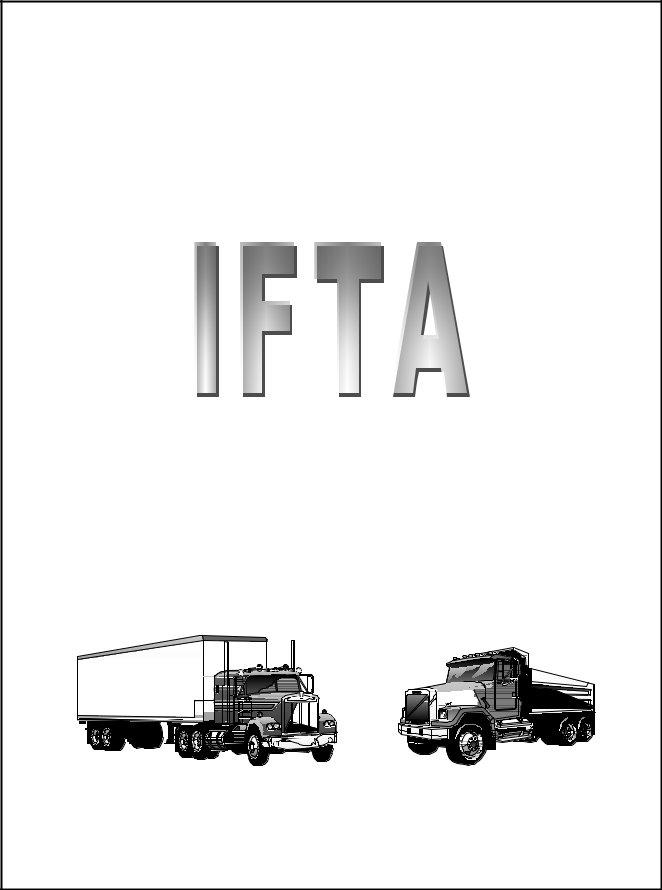In the realm of interstate and inter-jurisdictional motor carrier operations, understanding and navigating through the complexities of fuel taxation is a critical component of compliant and efficient business conduct. The State of New Jersey's adaptation of the International Fuel Tax Agreement (IFTA) provides a streamlined approach to this challenge, allowing motor carriers operating across state lines and in Canadian provinces a simplified means of reporting and paying fuel taxes. Central to this framework is the New Jersey IFTA Licensee Manual, a document outlining the procedural steps for obtaining and maintaining IFTA credentials, including licenses and decals, which are essential for legal travel in all IFTA jurisdictions. Predicated on the foundational concepts of 'base jurisdiction' and 'qualified motor vehicle', the IFTA system in New Jersey is tailored to benefit the interstate motor carrier by reducing administrative burdens through a consolidated application process, a unified reporting system, and in most cases a single audit conducted by the base jurisdiction. Highlighting the benefits, application requirements, and operational guidelines, the manual serves as a navigational tool for carriers to harmonize their operations with the regulatory demands of multiple jurisdictions, thereby facilitating cost and time efficiency. This overview intends to unpack the critical elements of the New Jersey IFTA framework as delineated in the manual, providing a cohesive understanding of its impact on interstate motor carrier operations.
| Question | Answer |
|---|---|
| Form Name | Nj Ifta Form |
| Form Length | 17 pages |
| Fillable? | No |
| Fillable fields | 0 |
| Avg. time to fill out | 4 min 15 sec |
| Other names | ifta nj, nj ifta login, nj ifta quarterly tax return, nj ifta form |

STATE OF |
NEW JERSEY |
INTERNATIONAL |
FUEL TAX |
AGREEMENT |
LICENSEE MANUAL |
JANUARY 2006 |

IFTA Licensee Manual
INTRODUCTION
The purpose of this manual is to outline the steps involved in licensing under the International Fuel Tax Agreement (IFTA). The International Fuel Tax Agreement is an agreement among states and Canadian Provinces to simplify the reporting of fuel taxes by
Upon application, the carrier's base jurisdiction will issue credentials (license and decals) that will allow the IFTA licensee to travel in all IFTA member jurisdictions.
New Jersey may be your base jurisdiction for IFTA licensing and reporting if:
1.You maintain the operational control and records for qualified motor vehicles in New Jersey or can make those records available in New Jersey.
2.You have qualified motor vehicles that actually travel on New Jersey highways; and
3.You operate in at least one other IFTA member jurisdiction.
The IFTA license offers several benefits to the interstate motor carrier: one application, one set of credentials, one quarterly tax report that reflects the net tax or refund due and in most circumstances one audit conducted by your base jurisdiction. These advantages all lead to cost and time savings for the interstate carrier.
Technical assistance and information concerning the International Fuel Tax Agreement can be obtained by contacting the Motor Vehicle Commission, Motor Carrier Services at the following address:
Motor Vehicle Commission
Motor Carrier Services
IFTA Section
225 E. State Street
P.O. Box 133
Trenton, NJ 08666
(609)
FAX: (609)
Contents
Page i

IFTA Licensee Manual |
|
CONTENTS |
|
I. Key Terms; "Base Jurisdiction" and "Qualified Motor Vehicle" |
1 |
II. Registration |
2 - 4 |
A. Application Requirements |
2 |
B. IFTA Fees |
2 |
C. IFTA Credentials |
2 - 3 |
1. License |
2 |
2. Decals |
2 |
3. Temporary IFTA Permit |
2 |
4. Single Trip Permits |
2 - 3 |
D. Reporting Requirements |
3 |
E. Penalty and Interest |
4 |
F. Compressed Natural Gas (CNG) |
4 |
G. Refunds and Credits |
4 |
H. |
4 |
I. Exempt Fuel Use |
4 |
III. Lease Agreements and Tax Responsibilities |
5 |
IV. License Cancellation, Suspension, Revocation, Reinstatement, and Renewal |
6 |
A. License Cancellation |
6 |
B. License Suspension and Revocation |
6 |
C. License Reinstatement |
6 |
D. Renewals |
6 |
V. Record Keeping Requirements |
7 - 8 |
A. Mileage Records |
7 |
B. Fuel Receipts |
7 |
C. Bulk Fuel Storage |
7 |
D. Record Retention Period |
8 |
E. Conversion Table |
8 |
VI. Audit |
9 |
VI. Appeals |
9 |
VII. Power of Attorney |
9 |
VIII. Definitions |
10 - 14 |
Contents
Page ii

IFTA Licensee Manual
I. KEY TERMS
"Base Jurisdiction" and "Qualified Motor Vehicle"
Two basic terms shape the workings of IFTA. The first term, "base jurisdiction," establishes the jurisdiction to which a carrier will license, obtain decals and make fuel tax payments. Your base jurisdiction will then distribute the appropriate amounts of tax owed to each IFTA member jurisdiction for you. New Jersey may be your base jurisdiction if:
1.Your vehicle(s) is registered in New Jersey.
2.Your vehicle's records are maintained or can be made available in New Jersey; and
3.At least one of your vehicles travels within New Jersey
The second term defines the kinds of vehicles that qualify for an IFTA license. These "qualified motor vehicles" are defined as motor vehicles used, designed or maintained to transport people or property and that:
1.Have two axles and a gross vehicle weight or registered gross vehicle weight exceeding 26,000 pounds, or 11,797 kilograms; or
2.Have three or more axles, regardless of weight; or
3.Are used in combination when such combination exceeds a gross vehicle weight or registered gross vehicle weight of 26,000 pounds or 11,797 kilograms.
Recreational vehicles are not considered qualified vehicles.
If you have more than one fleet operating out of more than one jurisdiction, more than one jurisdiction could qualify as your base jurisdiction. In this instance, the jurisdictions involved may agree
to designate one jurisdiction as your base jurisdiction. This designation must be approved in writing by each affected jurisdiction.
Note: For a list of exempt vehicles, see the definitions.
Key Terms
Page 1

IFTA Licensee Manual
II. REGISTRATION
A. Application Requirements
Any motor carrier based in New Jersey and operating one (1) or more qualified motor vehicles in at least one other IFTA member jurisdiction must file an IFTA License application in New Jersey. If a carrier qualifies as an IFTA licensee but does not wish to participate in the IFTA program, trip permits must be obtained to travel through member jurisdictions in accordance with the regulations of each member jurisdiction. Applications must be filled out completely and typed or printed in ink.
Submit the completed application along with proof of the principal place of business to the New Jersey Motor Vehicle Commission, Motor Carrier Services, IFTA Section, PO 133, 225 E. State Street, Trenton, NJ
A carrier will not be issued IFTA credentials if its current fuel use tax account is delinquent, or if the carrier was previously licensed in another IFTA member jurisdiction and the carrier's license has been suspended or revoked and is still in that status in that member jurisdiction. The Motor Vehicle Commission will not issue a license if the license application submitted contains misrepresentations, misstatements or omissions of required information.
B. IFTA Fees
IFTA licenses are renewed and decals are issued annually. The decals are $10 per set. Refunds will not be issued for excess decal orders or decals ordered in error.
C. IFTA Credentials
1. License
An IFTA license will be issued for each qualified carrier operating in IFTA member jurisdictions. The license or a photocopy of the IFTA license must be maintained in the cab of each qualified motor vehicle. The IFTA license is valid for the calendar year January 1 through December 31. If a carrier is found operating a qualified motor vehicle without an IFTA license, the vehicle operator may be subject to the purchase of a trip permit and a fine.
2. Decals
Two decals will be issued for each qualified motor vehicle operated by the IFTA licensee. IFTA requires that one decal be placed on the exterior of the passenger's side of the power unit. The second decal should be placed on the exterior portion of the driver's side of the power unit. A licensee may request extra decals for fleet additions. Decals that are assigned to new
3. Temporary IFTA Permit
This is a permit issued by the base jurisdiction to be carried in a qualified motor vehicle in lieu of permanent annual decals. A temporary permit is
be issued only to currently registered IFTA carriers.
4. Single Trip Permits
In lieu of registration in a motor fuel use tax program, an interstate motor carrier who operates commercial vehicles in New Jersey must purchase a
Registration
Page 2

IFTA Licensee Manual
each. Note: under the same circumstances you will most likely be required to purchase trip permits in other IFTA member jurisdictions, where prices and time periods will vary.
D. Reporting Requirements
All licensees must file an IFTA quarterly tax report with the Motor Carriers Unit, IFTA Section. The tax due or refund amount is calculated for each member jurisdiction on this report. If there is a net tax due, the licensee will submit a check to the State of New Jersey; if there is a refund due, the licensee will receive a refund check from the State of New Jersey. Tax rates provided with the IFTA quarterly tax report will be current for all member jurisdictions. The following information is required on the IFTA quarterly tax report:
1.Total miles, taxable and nontaxable, traveled by the licensee's qualified motor vehicles in all jurisdictions, IFTA and
2.Total gallons of fuel consumed, taxable and nontaxable, by licensee's qualified motor vehicles in all jurisdictions, IFTA and
3.Total miles and taxable miles traveled in each member jurisdiction;
4.Taxable gallons consumed in each member jurisdiction;
5.
6.Current tax rates for each member jurisdiction.
The IFTA quarterly tax report will be sent to all IFTA licensees at least thirty (30) days before the due date. Failure to receive the quarterly tax report does not release the licensee from reporting obligations.
A quarterly tax report must be filed even if the licensee does not operate or purchase taxable fuel in any IFTA member jurisdiction in a particular quarter.
The due date for the quarterly tax report is the last day of the month immediately following the close of the quarter for which the report is being filed.
These dates are as follows:
Reporting Quarter |
Due Date |
April 30 |
|
July 31 |
|
October 31 |
|
January 31 |
The quarterly tax report must be postmarked by the due date. If the due date is a Saturday, Sunday or legal holiday, the next business day is considered the due date. The licensee will be subject to the IFTA penalty and interest provisions if the report is not filed in a timely manner. Operating suspensions will be applied to delinquent accounts.
Registration
Page 3

IFTA Licensee Manual
E. Penalty and Interest
If a licensee fails to file a report, files a late tax report, or fails to remit any tax due, the licensee is subject to penalty and interest. The penalty for failure to file a tax report when due is the greater of fifty dollars ($50) or ten percent (10%) of the net tax due to all member jurisdictions. Interest is computed on all delinquent taxes due each jurisdiction at a rate of one percent (1%) per month, from the date of the tax due for each month, or fraction thereof, until paid. Delinquent accounts will be subject to suspension.
F. Compressed Natural Gas (CNG)
CNG and other fuels that cannot be measured in gallons must be converted to gallons by using the conversion factor used by the jurisdiction in which the fuel was consumed.
G. Refunds and Credits
A refund may be claimed on the IFTA tax report for any overpayment of tax in a reporting period. Please check the box on the IFTA tax report if a refund is requested. A refund will be issued after the Commission has determined that all tax liabilities, including any outstanding audit assessments, have been satisfied to all member jurisdictions. A refund may be denied if the licensee is delinquent in filing any quarterly tax report(s).
If a refund is not requested, the credit will be carried forward to the next period. Earned credits will
expire if not used after eight (8) quarters.
H.
IFTA recognizes that some jurisdictions have unique economic and geographic characteristics that have produced various definitions of
These miles should be reported. Total miles should be reduced only on the jurisdiction calculation, not the miles per gallon calculation.
I. Exempt Fuel Use
IFTA jurisdictions may define specific
not calculated on the IFTA tax report.
An exemption must be obtained from the jurisdiction in which the tax was paid. The licensee must maintain adequate records to support the exemption claimed and submit a separate refund claim for tax paid on
Registration
Page 4

IFTA Licensee Manual
III. LEASE AGREEMENTS AND TAX RESPONSIBILITIES
The carrier operating a vehicle is always responsible for the payment of fuel tax, unless a lease agreement specifically states otherwise. For example, if a carrier leasing a vehicle is stopped by a law enforcement officer and the lease agreement does not show that the lessor is responsible for the payment of fuel tax, the carrier will be held responsible. Similarly, a carrier who is audited by the Commission must have documentation proving that the payment of fuel tax is the responsibility of another party or the carrier must pay the tax.
The following five items, taken directly from the IFTA Articles of Agreement, address the tax responsibility of lessors, lessees, independent contractors and household goods agents.
1.The lessor who is regularly engaged in the business of leasing or renting motor vehicles without drivers for compensation to licensees or other lessees may be deemed to be the licensee, and such lessor may be issued a license if an application has been properly filed and approved by the base jurisdiction.
2.In the case of a carrier using independent contractors under
3.In the case of
a.The lessor has a written rental contract that designates the lessee as the party responsible for reporting and paying the fuel use tax; and
b.The lessor has a copy of the lessee's IFTA license which is valid for the term of the rental.
4.In the case of a carrier using independent contractors under
In case of a household goods carrier using independent contractors, agents, or service representatives, under intermittent leases, the party liable for fuel tax shall be:
a.The lessee (carrier) when the qualified motor vehicle is being operated under the lessee's jurisdictional operating authority. The base jurisdiction for purposes of this agreement shall be the base jurisdiction of the lessee (carrier), regardless of the jurisdiction in which the qualified motor vehicle is registered for vehicle registration purposes by the lessor or lessee.
b.The lessor (independent contractor, agent, or service representative) when the qualified motor vehicle is being operated under the lessor's jurisdictional operating authority. The base jurisdiction for purposes of this agreement shall be base jurisdiction of the lessor, regardless of the jurisdiction in which the qualified motor vehicle is registered for vehicle registration purposes.
5.No member jurisdiction shall require the filing of such leases, but you must make the leases available upon request of any member jurisdiction.
Lease Agreements and Tax Responsibilities
Page 5

IFTA Licensee Manual
IV. LICENSE CANCELLATION, SUSPENSION, REVOCATION, REINSTATEMENT, AND RENEWAL
A. License Cancellation
The IFTA license may be canceled at the request of any licensee provided all reporting requirements and tax liabilities to all member jurisdictions have been satisfied. The license may be canceled by submitting a written request for cancellation. Upon cancellation, the licensee must destroy the IFTA license and all unused decals.
B. License Suspension and Revocation
An IFTA license may be suspended and/or revoked for any of the following reasons:
1.Failure to file an IFTA quarterly tax report;
2.Failure to remit all taxes due all member jurisdictions;
3.Failure to pay and/or protest an audit assessment within the established time period; or
4.Failure to maintain adequate records or make records available when requested.
The Motor Vehicle Commission will notify all member jurisdictions when a suspension or revocation has occurred or has been released. Do not operate vehicles when a license has been revoked or
suspended.
C. License Reinstatement
The Motor Vehicle Commission may reinstate an IFTA license once the licensee files all required reports and satisfies all outstanding liabilities due all member jurisdictions.
D. Renewals
Renewals are mailed out automatically to active accounts in good standing. Only original renewal documents will be accepted.
License Cancellation, Suspension, Revocation, Reinstatement, and Renewal Page 6

IFTA Licensee Manual
V.
A. Mileage Records
It is the licensee's responsibility to maintain records of all interstate operations of qualified motor vehicles. The licensee's records must support the information reported on the quarterly tax report. The Individual Vehicle Mileage Record (IVMR), as required for the International Registration Plan, is an acceptable source document for recording vehicle mileage information. Another acceptable source document is a trip report which must include:
1.Date of trip (starting and ending);
2.Trip origin and destination (including city and state);
3.Routes of travel;
4.Beginning and ending odometer readings;
5.Total trip miles;
6.Mileage by jurisdiction;
7.Vehicle unit number; and
8.Licensee's name
B. Fuel Receipts
The licensee must maintain complete records of all fuel purchases. Separate totals must be compiled for each fuel type. Fuel types include Diesel, Gasoline, Gasohol, Propane and Natural Gas. The fuel records must contain:
1.Date of purchase;
2.Name and address of seller;
3.Number of gallons purchased;
4.Type of fuel purchased;
5.Price per gallon;
6.Unit number or license plate number of the vehicle into which the fuel was placed; and
7.Purchaser's signature
Acceptable fuel receipts include an invoice or a credit card receipt. Receipts which contain alterations or erasures will not be accepted.
C. Bulk Fuel Storage
A licensee who maintains bulk storage may obtain credit for tax paid on fuel withdrawn from that storage facility if the following records are maintained:
1.Date of withdrawal;
2.Number of gallons withdrawn;
3.Fuel type;
4.Unit number or license plate number of the vehicle into which the fuel was placed; and
5.Purchase and inventory records to substantiate that the tax was paid on all bulk fuel purchases.
Page 7

IFTA Licensee Manual
D. Record Retention Period
Every licensee shall maintain records to substantiate information reported on the quarterly tax report. These records must be maintained for a period of four (4) years from the due date of the return or the date that the return was filed, whichever is later. Records must be made available upon request by any member jurisdiction.
E. Conversion Table
1 liter |
= |
0.2642 gallons |
|
|
|
1 gallon |
= |
3.785 liters |
|
|
|
1 mile |
= |
1.6093 kilometers |
|
|
|
1 kilometer |
= |
0.62134 miles |
|
|
|
Page 8

IFTA Licensee Manual
VI. AUDIT
The base jurisdiction shall audit its licensees on behalf of all member jurisdictions. This shall not preclude another jurisdiction from also auditing a licensee. In that event, that jurisdiction shall pay all its audit expenses.
In the event that the licensee's records are not located in the base jurisdiction and the base jurisdiction must send auditors to the place records are kept, the base jurisdiction may require the licensee to reimburse the base jurisdiction for reasonable per diem and travel expenses of its auditors as authorized by law.
If any licensee fails to make records available upon proper request or if any licensee fails to maintain records from which the licensee's true liability may be determined, a base jurisdiction may, thirty (30) days after requesting in writing that the records be made available or receiving notification of insufficient records, determine a tax finding for each jurisdiction based upon the commissioner's determination of the tax liability of such licensee. The commissioner may make a determination from information previously furnished by the licensee, if available, and any other pertinent information that may be available to the commissioner.
VII. APPEALS
A licensee or applicant may appeal an action or audit finding issued by the commissioner of any member base jurisdiction by making a written request for a hearing within thirty (30) days after the service of notice of the original action or finding. If the hearing is not requested within thirty (30) days in writing, the original finding or action is final.
In the event that the licensee appeals an assessment for one or more jurisdictions, it will be the responsibility of the base jurisdiction to participate in the appeals process on the behalf of the other jurisdictions. The appeals process will be conducted according to the procedures established by the base jurisdiction.
VIII. POWER OF ATTORNEY
If a licensee uses a reporting service for motor fuel use tax reporting, a Power of Attorney must be placed on file annually at the time of renewal. Filing a Power of Attorney does not relieve the licensee of their legal obligations associated with the license. The licensee is still responsible for the payment of taxes as well as all acts and omissions of the reporting service.
Audit – Appeals - Power of Attorney
Page 9

IFTA Licensee Manual
DEFINITIONS
Applicant
A carrier in whose name the uniform application for licensing is filed with a base jurisdiction for the purpose of motor fuel tax reporting under the provisions of IFTA.
Audit
A physical examination of the records and source documents supporting the licensee's motor fuels use tax returns.
Base jurisdiction
The member jurisdiction where qualified motor vehicles are based for vehicle registration purposes, where the operational control and operational records of the licensee's qualified motor vehicles are maintained or can be made available, and where some travel is accrued by qualified motor vehicles within the fleet.
Cancellation
Deletion of a license and its provisions by either the Director or the licensee.
Carrier
A motor carrier.
Commuter bus service
According to
Mileage accrued for these purposes is exempt from tax and entitled to a refund through the Department of Taxation. Only taxable miles may be used for IFTA tax reporting.
Chief Administrator
The Chief Administrator of the Motor Vehicle Commission.
Commission
The Motor Vehicle Commission.
Exempt vehicle
Any vehicle owned or operated by an agency of this State or any political subdivision thereof, or any
Definitions
Page 10

IFTA Licensee Manual
manufacturer, converter and transporter general registration plates such as prescribed in N.J.S.A. 39:3- 18 and similar laws of other states; special mobile equipment not designed or used primarily for
the transportation of persons or property; vehicles operated not for profit by any religious or charitable organization; vehicles operated by a public utility as defined in N.J.S.A.
Fleet
One or more vehicles.
Identification marker
Or decal, the two words being interchangeable for the purposes of this subchapter, each means the identification marker that shall be affixed to the applicable motor vehicle provided for pursuant to N.J.S.A.
In- jurisdiction distance
The total number of miles or kilometers operated by a registrant's/licensee's qualified motor vehicle(s) within a jurisdiction including miles operated under an IFTA temporary permit.
International Fuel Tax Agreement
Agreement or "IFTA" means the multijurisdictional agreement to make uniform the administration of motor fuels use taxation laws with respect to motor vehicles operated in multiple member jurisdictions, establish and maintain the concept of one license and administering base jurisdiction for each licensee, provide that a licensee's base jurisdiction will be the administrator of the Agreement and execute
all its provisions with respect to such licensee and execute the tax licensing under the name of the licensee, except as otherwise provided herein.
Jurisdiction
A state of the United States, the District of Columbia, or a province or territory of Canada.
Lease
A written document vesting exclusive possession and control of the operation of an apportioned vehicle to a lessee for a specific period of time.
Leased vehicle
A vehicle operated, but not owned, by a user who has the right to exclusive use, possession and control of the vehicle for a period of 30 days or more by virtue of a lease, contract or other arrangement.
Leasing company
A person, firm or corporation engaged in the business of leasing vehicles.
Lessee
A person on entity to whom or which a lease is conveyed.
Definitions
Page 11

IFTA Licensee Manual
Lessor
A person or entity granting a lease.
License
The cab card or identification card issued by the Director to a motor carrier who has made successful application to the Director for IFTA credentials.
Licensee
A carrier who holds an uncancelled Agreement license issued by a base jurisdiction.
Motor carrier
A person, firm, corporation or partnership who transports persons or property by vehicle as a business in itself or in the furtherance of a commercial enterprise.
Motor fuels
Any combustible liquid or gaseous substance used, or suitable for, the generation of power to propel motor vehicles.
Motor fuel tax
A tax imposed at a rate equal to the sum of: the tax rate per gallon on motor fuels imposed under N.J.S.A.
Operations
Operations of all qualified motor vehicles, whether loaded or empty, whether for compensation or not, and whether owned by, contracted for use by, or leased by the user who operates or causes them to be operated, except operations of an omnibus in a regular route bus operation as defined in N.J.S.A. 48:4- 1 and under operating authority conferred pursuant to N.J.S.A.
Principal place of business
The place where the user transacts principal business, makes up and approves payroll, maintains a central file of corporate records and maintains principal executive offices. If not all of the above functions are performed in one place, then that place in which the majority of such functions are performed shall be deemed to be the principal place of business. In any event, the term "Principal place of business" shall mean that place at which the user does, in fact, principally transact and control its business affairs.
Purchaser
The person, firm or corporation who or which purchases fuel and pays the motor fuel tax thereon, used in the qualified motor vehicles of the licensee.
Qualified motor vehicle
A motor vehicle that is not an exempt vehicle and that is used, designed or maintained for transportation of persons or property, having (1) two axles and a gross vehicle or registered gross vehicle weight in excess of 26,000 pounds, or (2) three or more axles, regardless of weight if such combination is in excess of 26,000 pounds or 11,797 kilograms gross vehicle or registered gross vehicle weight.
Recreational vehicle
Vehicles such as motor homes, pickup trucks with attached campers, and buses when used exclusively for personal pleasure by an individual. In order to qualify as a recreational vehicle, the vehicle must not be used in connection with any business endeavor.
Definitions
Page 12

IFTA Licensee Manual
Registration
The qualification of motor vehicles normally associated with a prepayment of licensing fees for the privilege of using the highway and the issuance of license plates and a registration card or temporary registration containing owner and vehicle data.
Rental company
A person, firm or corporation engaged in the business of renting vehicles to the general public, including motor carriers, on an hourly, daily, trip, or other
Rental vehicle
A vehicle owned by a rental company and rented to the general public on an hourly, daily, trip, or other
Reporting period
The period of time consistent with the calendar quarterly periods of January 1 - March 31, April 1 - June 30, July 1 - September 30, and October 1 - December 31.
Revocation
Withdrawal of license and privileges by the licensing jurisdiction.
Special mobile equipment
Every vehicle not designed or used primarily for the transportation of persons or property nor designed to tow a trailer or some other
Suspension
Temporary removal of privileges granted to the licensee by the licensing jurisdiction.
Temporary permit
A permit issued by the base jurisdiction or its agent to be carried in a qualified vehicle in lieu of display of the permanent annual decals. A temporary permit is valid for a period of 30 days in order to allow a carrier sufficient time to affix permanent decals and carry the identification card.
Total distance
All miles or kilometers traveled during the reporting period by every qualified vehicle in a licensee's fleet, regardless of whether the miles or kilometers are considered taxable or
Trip lease
Rental of a vehicle from a user for a period of less than 30 days. A vehicle operated on a trip lease basis is deemed to be a rental vehicle and the user is deemed to be a rental company.
Trip permit
A
Definitions
Page 13

IFTA Licensee Manual
User
Every person, firm or corporation that operates or causes to be operated a qualified motor vehicle on any highway in this State. The term shall include a rental company in the case of a rental vehicle.
Weight
The maximum weight of a loaded vehicle or combination of vehicles during a registration period.
Definitions
Page 14